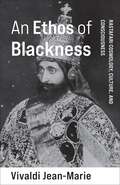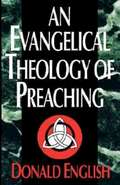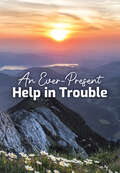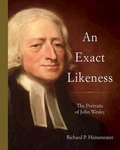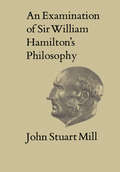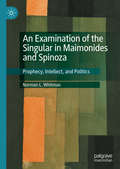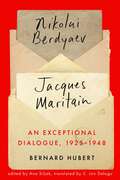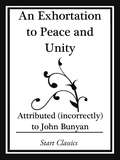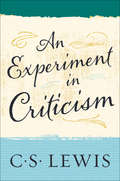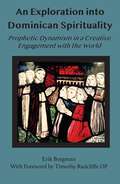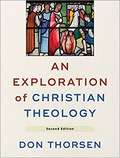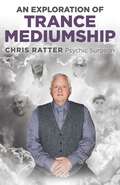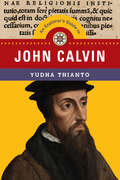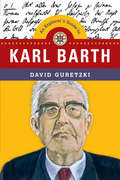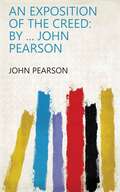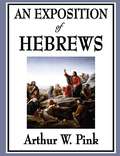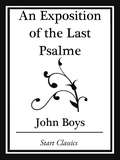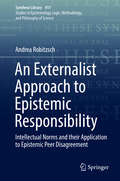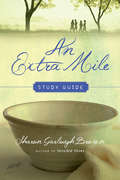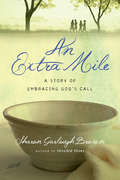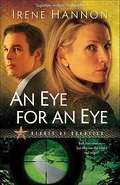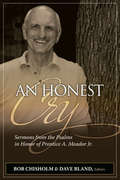- Table View
- List View
An Ethos of Blackness: Rastafari Cosmology, Culture, and Consciousness (Black Lives in the Diaspora: Past / Present / Future)
by Vivaldi Jean-MarieRastafari is an Afrocentric social and religious movement that emerged among Afro-Jamaican communities in the 1930s and has many adherents in the Caribbean and worldwide today. This book is a groundbreaking account of Rastafari, demonstrating that it provides a normative conception of Blackness for people of African descent that resists Eurocentric and colonial ideas.Vivaldi Jean-Marie examines Rastafari’s core beliefs and practices, arguing that they constitute a distinctively Black system of norms and values—at once an ethos and a cosmology. He traces Rastafari’s origins in enslaved people’s strategies of resistance, Jamaican Revivalism, and Garveyism, showing how it incorporates ancestral religious traditions and emancipatory politics. An Ethos of Blackness draws out the significance of practices such as avoiding technological exploitation of natural artifacts and the belief in living in harmony with the natural order. Jean-Marie considers Rastafari’s theology, exploring its reinterpretation of biblical scriptures and its foundations in the rejection of Christianity’s Eurocentrism and racism. However, he insists, before Rastafari can fulfill its promise of liberation for people of African descent, it must confront its failure to include women and redress sexism.Through rigorous and sensitive reflections on Rastafari culture and cosmology, this book offers deeply original insights into the Black theological imagination.
An Evangelical Theology of Preaching
by Donald EnglishBy exploring the biblical basis for preaching, Donald English shows how fundamental theological issues pertain to the proclamation of the Word. He provides a theological basis for preaching, practical insights regarding the movement from text to sermon, and practical guidance in preparing for Sunday worship.
An Ever After Summer
by Debra CloptonIt all started with an ad in a mail-order bride catalogue . . .Ellie had no idea she's not what Matthew ordered. And what's wrong with being a "Bible thumper" anyway? She's determined to show him she's tougher than she looks--and just the girl he needs.
An Ever-Present Help in Trouble
by WELS Christian Aid and ReliefWhere is God when I need him?When people are experiencing a personal or widespread crisis in life—whether economical, natural, medical, a loss, or another traumatic experience—asking where God can be found is often the first response.Christians ask that question too.This portable devotional booklet contains 40 devotions that offer gospel comfort to you. They share the comfort of God's love and providence with those suffering from life's disasters, reminding you of God's promises of strength. The book also features helpful prayers that ask for God's aid in various times of disaster.An Ever-Present Help in Trouble is by ten, solidly Christian writers and it is their prayer that this little book of devotions will bring you a measure of calm in the chaos. It isn't filled with clever advice to reduce stress, nor relaxation techniques to lower your blood pressure. Instead, it is filled with the words and promises of a gracious God, a God who loves you so much he sent his only, dear Son to die for you—all so that you could have the peace of forgiveness and the hope of eternal life.In this book, you will read brief devotions written especially for people who are suffering. May the devotions calm your heart and strengthen your soul. May they help you see that God is your ever-present help in trouble.
An Exact Likeness: The Portraits of John Wesley
by Richard P. HeitzenraterFaces are more than a montage of organs that see, breathe, speak, hear, eat, sing, smell, and yell. As Josephine Tey points out in her mystery novel, The Daughter of Time, the slant of an eyebrow, the set of a mouth, the look of the eye, the firmness of a chin, often can provide evidence of character that is as telling as a report card or a police blotter. Those features depicted on portraits of individuals can be equally telling of the person’s inner nature or perhaps of what the artist thinks (or wants the viewer to think) about the person being portrayed. Sometimes a portrait might be even more useful than a biography.While examining these portraits, the author considers three questions: what was Wesley’s attitude toward the portrait (if any), how did the public respond to these portrayals, and what was the artist attempting to convey? This book focuses on the main portraits and their derivatives, looking at them within the three main categories that developed over the years: Oxford don, Methodist preacher, and notable person. Although these types seemed to arise in chronological order, there is some overlap between categories, especially toward the end of Wesley’s life and beyond.
An Examination of Sir William Hamilton's Philosophy
by Alan Ryan John Stuart Mill John RobsonAppearing just before his successful parliamentary candidature, the Examination, with its deliberate and explicit onslaught on the intuitionists who were, in Mill's view, allied with anti-progressive political and religious forces, brought his beliefs into the public arena in a new way. Some of those who supported him politically found themselves viciously attacked because they had associated themselves with one who assailed settled religious beliefs. Other religionists who rejected many of Mill's attitudes strong expressed their admiration of the Examination because of its exposure to what they, with him, saw as dangerous theological and moral positions.Alan Ryan's analytical and historial introduction dwells on the most significant philosophical elements in the work, placing them in perspective and showing their relations to other aspects of Mill's thought. The textual introduction, by John M. Robson, examines the treatise in context of Mill's life in the 1860s, outlines its composition, and discusses, among other matters, the importance of the extensive revisions Mill made, mostly in response to critics. These revisions appear in full in the textual apparatus. Also provided are a bibliographical index, which gives a guide to the literature on the subject, and a collation of Mill's quotations, an analytical index, and appendices giving the reading of manuscript fragments and listing textual emendations.
An Examination of the Singular in Maimonides and Spinoza: Prophecy, Intellect, and Politics
by Norman L. WhitmanThis book presents an alternative reading of the respective works of Moses Maimonides and Baruch Spinoza. It argues that both thinkers are primarily concerned with the singular perfection of the complete human being rather than with attaining only rational knowledge. Complete perfection of a human being expresses the unique concord of concrete activities, such as ethics, politics, and psychology, with reason. The necessity of concrete historical activities in generating perfection entails that both thinkers are not primarily concerned with an “escape” to a metaphysical realm of transcendent or universal truths via cognition. Instead, both are focused on developing and cultivating individuals’ concrete desires and activities to the potential benefit of all. This book argues that rather than solely focusing on individual enlightenment, both thinkers are primarily concerned with a political life and the improvement of fellow citizens’ capacities. A key theme throughout the text is that both Maimonides and Spinoza realize that an apolitical life undermines individual and social flourishing.
An Exceptional Dialogue, 1925–1948: Nikolai Berdyaev and Jacques Maritain
by Bernard HubertIn 1924 the Russian Orthodox philosopher in exile Nikolai Berdyaev ended up in the environs of Paris, where he met and befriended the French Catholic philosopher Jacques Maritain. Coming from different faiths and disparate cultures, they shared a common desire to assert the essential dignity and rights of the human person in an era torn apart by extremism and conflict. They embarked on a joint endeavour to promote ecumenical dialogue and philosophical conversation in interwar Europe. Their collaboration was instrumental in developing a philosophy of Christian personalism and seminal in the emergence of existentialism.Newly translated into English, An Exceptional Dialogue, 1925–1948 reproduces the two thinkers’ correspondence, along with Bernard Hubert’s original introductory essay, his notes to the French edition, and a new introduction by Ana Siljak. An intimate and remarkable portrait emerges. The two men met and corresponded often during their two decades of friendship, their homes became spaces for conversations on religion and philosophy, and together they contributed to the development of a Christian humanism and personalism that inspired such disparate figures as Hannah Arendt and Martin Luther King Jr and that influenced Maritain’s work on the United Nations Universal Declaration of Human Rights.An Exceptional Dialogue, 1925–1948 reveals the connectedness between Russian and European thought, explores the contributions of French-Russian personalism to the history of human dignity, and provides insight into a strain of philosophy often ignored in contemporary scholarship.
An Exhortation to Peace and Unity
by John BunyanBeloved, religion is the great bond of human society; and it were well if itself were kept within the bond of unity; and that it may so be, let us, according to the text, use our utmost endeavours "to keep the unity of the Spirit in the bond of peace. " <P> <P> These words contain a counsel and a caution: the counsel is, That we endeavour the unity of the Spirit; the caution is, That we do it in the bond of peace; as if I should say, I would have you live in unity, but yet I would have you to be careful that you do not purchase unity with the breach of charity. John Bunyan was an Christian writer, preacher and. Reformed Baptist.
An Exhortation to Peace and Unity (Start Classics)
by John BunyanBeloved, religion is the great bond of human society; and it were well if itself were kept within the bond of unity; and that it may so be, let us, according to the text, use our utmost endeavours "to keep the unity of the Spirit in the bond of peace." These words contain a counsel and a caution: the counsel is, That we endeavour the unity of the Spirit; the caution is, That we do it in the bond of peace; as if I should say, I would have you live in unity, but yet I would have you to be careful that you do not purchase unity with the breach of charity. John Bunyan was an Christian writer, preacher and. Reformed Baptist.
An Experiment in Criticism
by C. S. LewisWhy do we read literature and how do we judge it? C. S. Lewis's classic An Experiment in Criticism springs from the conviction that literature exists for the joy of the reader and that books should be judged by the kind of reading they invite. He argues that "good reading," like moral action or religious experience, involves surrender to the work in hand and a process of entering fully into the opinions of others: "in reading great literature I become a thousand men and yet remain myself." Crucial to his notion of judging literature is a commitment to laying aside expectations and values extraneous to the work, in order to approach it with an open mind. Amid the complex welter of current critical theories, C. S. Lewis's wisdom is valuably down-to-earth, refreshing and stimulating in the questions it raises about the experience of reading.
An Exploration into Dominican Spirituality: Prophetic Dynamism in a Creative Engagement with the World (The Southern African Dominican Series)
by Erik Borgman'My aim in this book is to show clearly that the ... Dominican tradition ... is capable of shedding light on the questions of men and women today and suggesting a way of dealing with them. These questions are ultimately a variant of the one central question of human existence, bound up with a particular time, place and person: the question of a good and meaningful life ... my starting point is the basic conviction that a religious and dedicated life cannot be lived anywhere else than in the midst of our turbulent culture, which constantly makes us uncertain ... this book is deliberately written from the perspective of someone who in ecclesiastical jargon is called a "lay person".' From the Introduction by Erik Borgman 'This book is a highly attractive and stimulating exposition of Dominican spirituality by Erik Borgman, a Dutch Lay Dominican. The central intuition of the book is that Dominican spirituality is founded on the encounter of God in all of human experience. Dominic's experience in the early thirteenth century was born in opposition to Catharism, which maintained that God was remote from us and that there was a fundamental opposition between the divine and this material world. But for Dominic it is here, in our lives, with all their creativity and goodness, their mess and confusion, that God is to be found. Our mission as preachers pushes us "to enter the unrest of the street and the inn, politics and journalism, welfare, teaching and science, in the belief that the holy, the traces of the Holy One, are to be found there". Even in the most difficult situations, when all is dark, God is waiting to be discovered. "If Dominican spirituality has a core, then it would be this insight into the unexpected and unheard-of nearness of God'. This is the good news that the Order of Preachers was founded to preach and the source of the happiness of the preacher."' From the Foreword by Timothy Radcliffe OP
An Exploration of Christian Theology
by Don ThorsenThis introduction to Christian theology explores the whole Christian tradition in a simple and straightforward way. Leading Wesleyan theologian Don Thorsen surveys the theological views represented within historic Christianity and discusses the variety of positions held without favoring one over another. The book includes helpful end-of-chapter questions for further reflection and discussion, a convenient glossary of theological terms, and sidebars. The second edition is marked by a thorough updating of the text and the addition of two new chapters on apologetics and the future of the unevangelized.
An Exploration of Trance Mediumship
by Chris RatterWhen psychic surgeon Chris Ratter was starting out on his own path of unfolding trance mediumship, he found there was very little information available to clarify certain points or answer questions he had. His desire to ensure others did not feel the same isolation and confusion became his main motivation for writing An Exploration of Trance Mediumship. Chris takes the reader on a touching quest to find greater understanding of the bridge between our world and the world of spirit, explaining key aspects of trance mediumship as well as introducing the reader to his spirit team and providing insight as to how he came to know his individual guides. All mediumship is healing, and an accurate, perceptive verbal communication from a loved one in spirit has the power to mend a metaphorical broken heart. When it comes to the physical body, however, Chris's psychic surgery, which goes hand-in-hand with his trance mediumship, has the power to heal across the spectrum of psychological and physiological conditions.
An Explorer's Guide to John Calvin (Explorer's Guides Series)
by Yudha ThiantoCreation is the theater of God's glory. Scripture is like a pair of glasses that clarifies our vision of God. Justification is the hinge on which religion turns.Institutes of the Christian ReligionInstitutesInstitutesBooks in the Explorer's Guide series are accessible guidebooks for those studying the great Christian texts and theologians from church history, helping readers explore the context in which these texts were written and navigate the rich yet complex terrain of Christian theology.
An Explorer's Guide to Karl Barth (Explorer's Guides)
by David GuretzkiChurch Dogmaticsfrequently asked questionsa glossary of key concepts and personsa tour guide to Barth's early writingstips on how to write a paper on BarthChurch DogmaticsAn Explorer's Guide to Karl Barth
An Exposition Of The Creed
by John Pearson Temple ChevallierThis is a reproduction of a classic text optimised for kindle devices. We have endeavoured to create this version as close to the original artefact as possible. Although occasionally there may be certain imperfections with these old texts, we believe they deserve to be made available for future generations to enjoy.
An Exposition of Hebrews
by Arthur W. PinkAn Exposition of Hebrews is the most complete and thorough study ever written on the subject. This books spends close to six hundred thousand words looking at every nuance and implication of the book of Hebrews. A wonderful tool for pastors, students, or anyone wishing a deeper understanding of this important book from the bible. Originally pushed as a series of articles and then as a two volume set, you can now have the entire unabridged edition of this book in one affordable volume.
An Exposition of the Last Psalme (Start Classics)
by John Boys"An Exposition of the Last Psalme", published in 1613, was delievered as a sermon by John Boys.
An Externalist Approach to Epistemic Responsibility: Intellectual Norms and their Application to Epistemic Peer Disagreement (Synthese Library #411)
by Andrea RobitzschThis monograph provides a novel reliabilist approach to epistemic responsibility assessment. The author presents unique arguments for the epistemic significance of belief-influencing actions and omissions. She grounds her proposal in indirect doxastic control.The book consists of four chapters. The first two chapters look at the different ways in which an agent might control the revision, retention, or rejection of her beliefs. They provide a systematic overview of the different approaches to doxastic control and contain a thorough study of reasons-responsive approaches to direct and indirect doxastic control.The third chapter provides a reliabilist approach to epistemic responsibility assessment which is based on indirect doxastic control.In the fourth chapter, the author examines epistemic peer disagreement and applies her reliabilist approach to epistemic responsibility assessment to this debate. She argues that the epistemic significance of peer disagreement does not only rely on the way in which an agent should revise her belief in the face of disagreement, it also relies on the way in which an agent should act.This book deals with questions of meliorative epistemology in general and with questions concerning doxastic responsibility and epistemic responsibility assessment in particular. It will appeal to graduate students and researchers with an interest in epistemology.
An Extra Mile Study Guide: A Story Of Embracing God's Call (Sensible Shoes Series)
by Sharon Garlough BrownWhat next steps is God calling you to take? Join the characters of An Extra Mile, the final book in the Sensible Shoes series, as they journey through the seasons of Lent and Easter. In this eight-week study guide you'll dive deeper into key spiritual practices from the book, using daily Scripture readings and reflection questions designed to help you be attentive to the invitations of the Holy Spirit. Each week concludes with discussion questions and suggested practices for groups to do together. This guide offers the perfect tools for individuals and groups to explore and apply the spiritual formation themes of An Extra Mile along with Mara, Hannah, Charissa, and Becca.
An Extra Mile: A Story of Embracing God's Call (Sensible Shoes Series)
by Sharon Garlough BrownSensible ShoesMara:Hannah:Charissa:Becca:
An Eye For An Eye (Heroes Of Quantico Ser. #2)
by Irene Hannon<P>After he accidentally shoots a teenager at a tense standoff, FBI Hostage Rescue Team member Mark Sanders is sent to St. Louis to work as a field agent and get his bearings while the bad press starts to settle. Just weeks away from returning to Quantico to resume his work on the HRT, Mark has a chance encounter with an old flame, Emily Lawson. <P>But their reunion is cut short by a sniper. Now Mark must find the shooter before he tries to strike again.<P> But what is his motive--and who was his intended target? Can Mark put the pieces together, keep Emily safe, and rekindle a long-dead relationship at the same time?<P> A fast-paced tale of romance, suspense, and intrigue, An Eye for an Eye is the exciting second installment in the Heroes of Quantico series.
An Heiress at Heart (Love's Grace #1)
by Jennifer DelamereA New BeginningA youthful indiscretion has cost Lizzie Poole more than just her honor. After five years living in exile, she's finally returning home, but she's still living a secret life. Her best friend Ria's dying wish was for Lizzie to assume her identity, return to London, and make amends that Ria herself would never live to make. Bearing a striking resemblance to her friend, and harboring more secrets than ever before, Lizzie embarks on a journey that tempts her reckless heart once again . . . A committed clergyman, Geoffrey Somerville's world is upended when he suddenly inherits the title of Lord Somerville. Now he's invited to every ball and sought after by the matchmaking mothers of London society. Yet the only woman to capture his heart is the one he cannot have: his brother's young widow, Ria. Duty demands he deny his feelings, but his heart longs for the mysterious beauty. With both their futures at stake, will Lizzie be able to keep up her façade? Or will she find the strength to share her secret and put her faith in true love?
An Honest Cry: Sermons from the Psalms in Honor of Prentice A. Meador, Jr.
by Bob ChisholmThe Book of Psalms has provided prayers and hymns for worship all through the history of the people of God. New Testament writers used the psalms to educate disciples about the nature of God's kingdom. For this reason, the psalms provide a vital resource for preaching in the church today.The psalms express the deepest and most heartfelt human emotions one will ever witness. They articulate the mountain peak experiences of praises to God. They plummet to the depths of human despair. They provide consolation. The psalmists stand completely honest before God and challenge preachers to do the same. This kind of honesty is what the people of God long to hear from the pulpit today.In An Honest Cry, twenty preachers share sermons from the whole range of the psalms -- psalms of distress, hatred, sorrow, frailty, trust, joy, and peace. They offer these sermons in memory and honor of their friend and fellow preacher Prentice Meador Jr. for whom the Book of Psalms was always a treasured resource.This book includes chapters from the late Prentice Meador and his son, Mark. Additional contributing writers include Royce Money, Jack Reese, Gary Holloway, Landon Saunders, Mike Cope, Chris Seidman, David Rubio, Scott Sager, Tom A. Jones, Collin Packer, Harold Hazelip, Jim Martin, Lynn Anderson, Rick Atchley, Jennings Davis, Ken Durham, John York and Tim Spivey, Randy Lowry, and Bob Chisholm.
